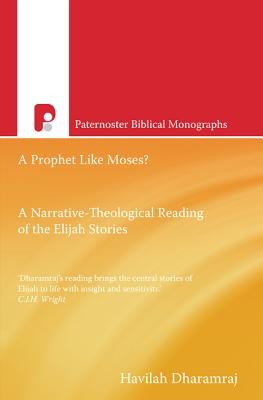
- We will send in 10–14 business days.
- Author: Havilah Dharamraj
- Publisher: Paternoster Publishing
- ISBN-10: 184227533X
- ISBN-13: 9781842275337
- Format: 15.2 x 22.9 x 1.6 cm, minkšti viršeliai
- Language: English
- SAVE -10% with code: EXTRA
Reviews
Description
In evaluating Elijah as a prophet after the Mosaic paradigm, Dr Havilah Dharamraj proposes a radically different schema for interpreting what is one of the most dramatic and difficult texts in the Old Testament, namely, the earthquake-wind-and-fire theophany at Horeb (1 Kings 19).
Since rabbinic times, the resonance between the Moses stories and the Elijah stories has been regularly noted. Taking into account that Deut. 18:18 promises Israel a 'prophet like Moses', this resonance compels an evaluation of Elijah, holding Moses as the benchmark. Here, scholarship struggles with a paradox. At Horeb Elijah fails in the critical prophetic task of intercession. Yet, his service as prophet is affirmed beyond doubt in his iconic whirlwind-and-chariots-of-fire exit. How are these to be reconciled? Is Elijah a prophet of Mosaic fibre or not? This work offers a strikingly different approach to the Elijah stories. Dharamraj employs the narrative critical method to offer a close reading of the text. Such an approach opens up intriguing possibilities in interpretation. Here, her analysis of the dramatic and difficult discourse of the earthquake-wind-fire- 'still, small voice' theophany at Horeb is notable. So also, is the case she carefully builds for whether Elijah emerges as the hoped-for 'prophet like Moses'.
EXTRA 10 % discount with code: EXTRA
The promotion ends in 23d.16:32:54
The discount code is valid when purchasing from 10 €. Discounts do not stack.
- Author: Havilah Dharamraj
- Publisher: Paternoster Publishing
- ISBN-10: 184227533X
- ISBN-13: 9781842275337
- Format: 15.2 x 22.9 x 1.6 cm, minkšti viršeliai
- Language: English English
In evaluating Elijah as a prophet after the Mosaic paradigm, Dr Havilah Dharamraj proposes a radically different schema for interpreting what is one of the most dramatic and difficult texts in the Old Testament, namely, the earthquake-wind-and-fire theophany at Horeb (1 Kings 19).
Since rabbinic times, the resonance between the Moses stories and the Elijah stories has been regularly noted. Taking into account that Deut. 18:18 promises Israel a 'prophet like Moses', this resonance compels an evaluation of Elijah, holding Moses as the benchmark. Here, scholarship struggles with a paradox. At Horeb Elijah fails in the critical prophetic task of intercession. Yet, his service as prophet is affirmed beyond doubt in his iconic whirlwind-and-chariots-of-fire exit. How are these to be reconciled? Is Elijah a prophet of Mosaic fibre or not? This work offers a strikingly different approach to the Elijah stories. Dharamraj employs the narrative critical method to offer a close reading of the text. Such an approach opens up intriguing possibilities in interpretation. Here, her analysis of the dramatic and difficult discourse of the earthquake-wind-fire- 'still, small voice' theophany at Horeb is notable. So also, is the case she carefully builds for whether Elijah emerges as the hoped-for 'prophet like Moses'.


Reviews